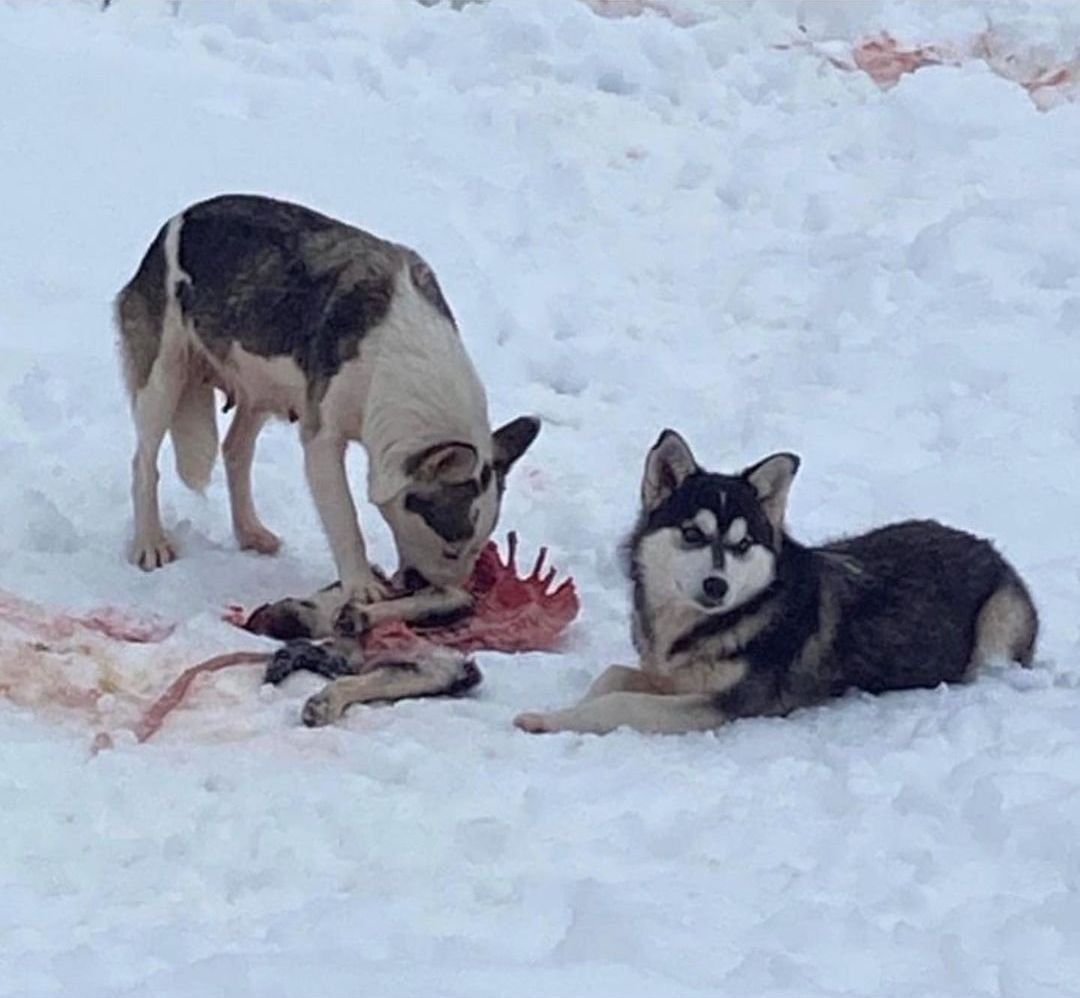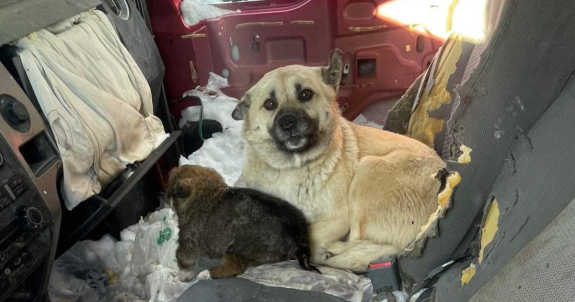Animal Justice is working to help dog rescue groups in Manitoba tackle the crisis of dog overpopulation and a lack of veterinary services in many remote First Nations communities. Rescue groups are sounding the alarm over the crisis, and swift action is needed from the provincial and federal governments to develop a comprehensive, Indigenous-led approach to prevent animal suffering and protect community members.
Thousands of dogs and puppies freeze to death in Manitoba’s frigid winter months. Countless others endure devastating pain and distress due to starvation; a lack of access to vaccinations, deworming, and spay and neutering services; being left to suffer without vet care following vehicle strikes or dog fights; and being shot during culls, often leading to a slow death.
Dog attacks also occur in communities lacking necessary bylaws, enforcement officers, dog food, and vet services. In fact, children in reserve communities are 180 times more likely to be attacked by a dog than other children. While many victims survive these traumatic attacks, some have tragically been killed by dogs. Aggressive behaviour in dogs can occur as dogs suffering from extreme hunger search for food, as well as due to a lack of access to spay and neutering services, and large roaming dog populations. These traumatic attacks are totally preventable.
Manitoba’s dog overpopulation crisis is also causing compassion fatigue, burn out, and fear among dog protection advocates both on and off reserve.
Save A Dog Network Canada, the Winnipeg Humane Society, and countless other groups have been working around the clock with compassionate community members and First Nations leaders to support dogs and puppies, as well as communities, but more must be done. It’s time for the federal and provincial governments to step up and support a sustainable, Indigenous-led plan to protect dogs and community health and safety in Manitoba.

Photo: Save A Dog Network
Dog Overpopulation
Dog overpopulation and lack of access to veterinary resources in many Manitoba First Nations communities are complex problems stemming from many underlying challenges, including the impacts of colonial harm, racism, and intergenerational trauma.
Though dogs have a long history in human communities around the world, today’s domesticated dogs can be traced to dogs selectively bred in Europe and other places and brought to Canada. Tools such as public education, veterinary services, effective bylaws, and well-resourced animal bylaw enforcement services are all needed to address dog overpopulation and related animal welfare and community safety problems, yet these key services have been withheld from many Indigenous communities in Canada.
Addressing these complex problems requires compassion, learning, and respect rather than blame, ignorance, and judgment. In our work to improve the lives of dogs and community members, Animal Justice recognizes the need to understand our role in reconciliation and the need to support and empower communities in the development and implementation of sustainable tools to address this crisis.
An all-too-common response to mauling incidents is for communities to cull dogs by shooting those who are roaming. Several dog shoots have been announced in Manitoba First Nation communities in 2024 alone. Unfortunately, dog shoots are a reactive approach that does not solve the underlying public health and safety risks, and instead causes more fear of dogs, traumatizes community members whose dogs are killed or who witness the shooting, and damages the human-animal bond. Dog shoots are an inhumane band-aid solution for communities that understandably want to protect residents, but are lacking the necessary resources, assistance, and support to develop effective, long-term solutions.
Thankfully, there is a strong and inspiring network of rescue groups working across Manitoba in partnership with First Nations communities and compassionate community members. And the newly-elected NDP government committed during the 2023 provincial election to increasing funding for mobile spay and neuter services in remote communities. This is a welcome and critical first step, but spaying and neutering dogs is only part of the multi-tiered, strategic approach that is needed.
Developing Sustainable, Effective, and Indigenous-Led Solutions
Animal Justice is working with rescue groups to call on the governments of Manitoba and Canada to bring together impacted community members and their leadership, animal welfare groups, veterinarians, and public health officials to create a sustainable, effective, and Indigenous-led plan to address this animal welfare and public health crisis. In addition to funding for spay and neuter services, this could include the establishment of advisory council or other body that brings together these key stakeholders to consider actions including:
- Assisting communities in developing and implementing animal welfare bylaws;
- Providing necessary funding, resources, and training for enforcement officers;
- Supporting the development and implementation of Indigenous-led public education to improve safety between humans and dogs;
- Funding and distribution of dog food as needed; and
- Access to veterinary services, including vaccination and deworming.
Finally, an important part of addressing Manitoba’s dog overpopulation crisis will include licensing dog breeders in the province and enacting strong standards to protect dogs at these facilities. For over a decade, the province has allowed dog breeders to operate without licences and standards, contributing to the dog overpopulation problem, while unnecessarily stretching the limited resources of shelters and rescues throughout Manitoba.
Take Action
Efforts to help dogs will only be meaningful and effective when they are based not only on compassion for dogs, but also on respect and compassion for the humans who live in impacted communities. This includes learning about and working to understand the histories and realities of community members and their ways of living, and working to support Indigenous-led approaches to tackling this complex and multi-faceted crisis.
Please join us in calling on Manitoba’s newly-elected government to support dogs and First Nations communities by developing a sustainable, compassionate, and Indigenous-led approach to tackling the province’s dog overpopulation crisis.
Banner: Save A Dog Network Canada




